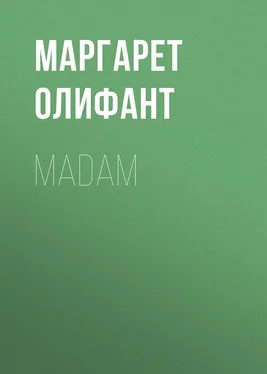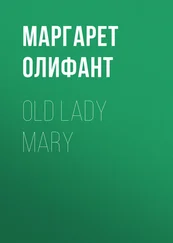Маргарет Олифант - Madam
Здесь есть возможность читать онлайн «Маргарет Олифант - Madam» — ознакомительный отрывок электронной книги совершенно бесплатно, а после прочтения отрывка купить полную версию. В некоторых случаях можно слушать аудио, скачать через торрент в формате fb2 и присутствует краткое содержание. Жанр: foreign_prose, literature_19, foreign_antique, на английском языке. Описание произведения, (предисловие) а так же отзывы посетителей доступны на портале библиотеки ЛибКат.
- Название:Madam
- Автор:
- Жанр:
- Год:неизвестен
- ISBN:нет данных
- Рейтинг книги:5 / 5. Голосов: 1
-
Избранное:Добавить в избранное
- Отзывы:
-
Ваша оценка:
- 100
- 1
- 2
- 3
- 4
- 5
Madam: краткое содержание, описание и аннотация
Предлагаем к чтению аннотацию, описание, краткое содержание или предисловие (зависит от того, что написал сам автор книги «Madam»). Если вы не нашли необходимую информацию о книге — напишите в комментариях, мы постараемся отыскать её.
Madam — читать онлайн ознакомительный отрывок
Ниже представлен текст книги, разбитый по страницам. Система сохранения места последней прочитанной страницы, позволяет с удобством читать онлайн бесплатно книгу «Madam», без необходимости каждый раз заново искать на чём Вы остановились. Поставьте закладку, и сможете в любой момент перейти на страницу, на которой закончили чтение.
Интервал:
Закладка:
A long time, it seemed a lifetime, passed before her repose was disturbed. It had gradually got to be like an habitual state, and she was startled to be called back from it. The heavy curtain was lifted, and first Mr. Blake, then Dr. Beaton, came forth. The first looked extremely grave and disturbed, as he came out with a case of papers which he had brought with him in his hand. He looked at Mrs. Trevanion with a curious, deprecating air, like that of a man who has injured another unwillingly. They had never been friends, and Madam had shown her sentiments very distinctly as to those overtures of admiration which the young lawyer had taken upon himself to make to Rosalind. The politeness he showed to her on ordinary occasions was the politeness of hostility. But now he looked at her alarmed, as if he could not support her glance, and would fain have avoided the sight of her altogether. Dr. Beaton, on the other hand, came forward briskly.
“I have just been called in to our patient,” he said, “and you are very much wanted, Mrs. Trevanion.”
“Does he want me?” she said.
“I think so—certainly. You are necessary to him; I understand your delicacy in being absent while Mr. Blake—”
“Do not deceive yourself, doctor; it was not my delicacy.”
“Come, please,” said the doctor, almost impatiently; “come at once.”
Blake stood looking after them till both disappeared behind the curtain, then drew a long breath, as if relieved by her departure. “I wonder if she has any suspicion,” he said to himself. Then he made a long pause and walked about the hall, and considered the pictures with the eye of a man who might have to look over the inventory of them for sale. Then he added to himself, “What an old devil!” half aloud. Of whom it was that he uttered this sentiment no one could tell, but it came from the bottom of his heart.
Madam did not leave the sick-chamber again that day. She did not appear at luncheon, for which perhaps the rest were thankful, as she was herself. How to look her in the face, with this mingled doubt of her and respect for her, nobody knew. Rosalind alone was disappointed. The doctor took everything into his own hands. He was now the master of the situation, and ruled everybody. “She is the best woman I ever knew,” he said, with fervor. “I would rather trust her with a case than any Sister in the land. I said to her that I thought she would do better to stay. Mr. Trevanion was very glad to get her back.”
CHAPTER XIV
As so often happens when all is prepared and ready for the catastrophe, the stroke of fate was averted. That night proved better than the last, and then there passed two or three quiet days. It was even possible, the doctor thought, that the alarm might be a false one, and the patient go on, if tranquil and undisturbed, until, in the course of nature, another crisis prepared itself or external commotion accelerated nature. He had received his wife back after her few hours’ banishment with a sort of chuckling satisfaction, and though even his reduced and enfeebled state did not make him incapable of offence, the insulting remarks he addressed to her were no more than his ordinary method. Madam said nothing of them; she seemed, strangely enough, glad to return to her martyrdom. It was better, it appeared, than the sensation of being sent away. She was with him, without rest or intermission, the whole day and a great portion of the night. The two or three hours allowed her for repose were in the middle of the night, and she never stirred abroad nor tasted the fresh air through this period of confinement. The drives which had been her daily refreshment were stopped, along with every other possibility of freedom. In the meantime there appeared something like a fresh development of confidence and dependence upon her, which wrung the heart of the enemy in her stronghold, and made Russell think her work had been all in vain. Mr. Trevanion could not, it was said, bear his wife out of his sight.
It is a mistake when a dying person thus keeps all his world waiting. The sympathetic faculties are worn out. The household in general felt a slight sensation of resentment towards the sick man who had cheated them into so much interest. It was not as if he had been a man whom his dependents loved, and he had defrauded them of that profound and serious interest with which the last steps of any human creature—unless in a hospital or other agglomeration of humanity, where individual characteristics are abolished—are accompanied. The servants, who had with a little awe attended the coming of death, were half disappointed, half disgusted by the delay. Even John Trevanion, who had made up his mind very seriously and somewhat against his own convictions to wait “till all was over,” had a sensation of annoyance: he might go on for weeks, perhaps for months, all the winter—“thank God!” they said, mechanically; but John could not help thinking how inconvenient it would be to come back—to hang on all the winter, never able to go anywhere. It would have been so much more considerate to get it over at once, but Reginald was never one who considered other people’s convenience. Dr. Beaton, who had no desire to leave Highcourt, and who, besides, had a doctor’s satisfaction in a successful fight with disease, took it much more pleasantly. He rubbed his hands and expressed his hopes of “pulling” his patient through, with much unnecessary cordiality. “Let us but stave off all trouble till spring, and there is no saying what may happen,” he said, jauntily. “The summer will be all in his favor, and before next winter we may get him away.” The younger members of the family took this for granted. Reginald, who had been sent for from school, begged his mother another time to be sure there was some real need for it before summoning a fellow home in the middle of the half; and Rosalind entirely recovered her spirits. The cloud that had hung over the house seemed about to melt away. Nobody was aware of the agitating conferences which Jane held with her mistress in the few moments when they saw each other; or the miserable anxiety which contended in Madam’s mind with her evident and necessary duties. She had buried her troubles too long in her own bosom to exhibit them now. And thus the days passed slowly away; the patient had not yet been allowed to leave his bed, and, indeed, was in a state of alarming feebleness, but that was all.
Rosalind was left very much to herself during these days. She had now no longer any one to go out with. Sometimes, indeed, her uncle would propose a walk, but that at the most occupied but a small part of the day, and all her usual occupations had been suspended in the general excitement. She took to wandering about the park, where she could stray alone as much as pleased her, fearing no intrusion. A week or ten days after the visit of Mr. Blake, she was walking near the lake which was the pride of Highcourt. In summer the banks of this piece of water were a mass of flowering shrubs, and on the little artificial island in the middle was a little equally artificial cottage, the creation of Rosalind’s grandmother, where still the children in summer would often go to have tea. One or two boats lay at a little landing-place for the purpose of transporting visitors, and it was one of the pleasures of the neighborhood, when the family were absent, to visit the Bijou, as it was called. At one end of the little lake was a road leading from the village, to which the public of the place had a right. It was perhaps out of weariness with the monotony of her lonely walks that Rosalind directed her steps that way on an afternoon when all was cold and clear, an orange-red sunset preparing in the west, and indications of frost in the air. The lake caught the reflection of the sunset blaze and was all barred with crimson and gold, with the steely blue of its surface coming in around and intensifying every tint. Rosalind walked slowly round the margin of the water, and thought of the happy afternoons when the children and their mother had been rowed across, she herself and Rex taking the control of the boat. The water looked tempting, with its bars of color, and the little red roof of the Bijou blazed in the slanting light. She played with the boats at the landing-place, pushing one into the water with a half fancy to push forth into the lake, until it had got almost too far off to be pulled back again, and gave her some trouble, standing on the edge of the tiny pier with an oar in her hand, to bring it back to its little anchorage. She was standing thus, her figure relieved against the still, shining surface of the water, when she heard a footstep behind her, and thinking it the man who had charge of the cottage and the boats, called to him without turning round, “Come here, Dunmore; I have loosed this boat and I can’t get it back—”
Читать дальшеИнтервал:
Закладка:
Похожие книги на «Madam»
Представляем Вашему вниманию похожие книги на «Madam» списком для выбора. Мы отобрали схожую по названию и смыслу литературу в надежде предоставить читателям больше вариантов отыскать новые, интересные, ещё непрочитанные произведения.
Обсуждение, отзывы о книге «Madam» и просто собственные мнения читателей. Оставьте ваши комментарии, напишите, что Вы думаете о произведении, его смысле или главных героях. Укажите что конкретно понравилось, а что нет, и почему Вы так считаете.












